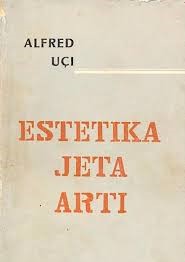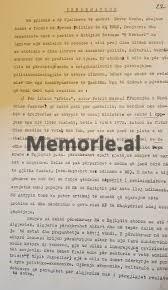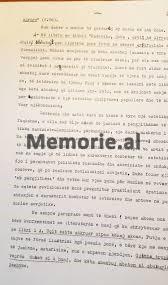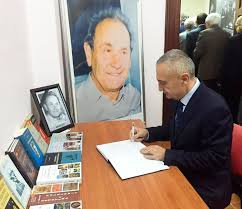Dashnor Kaloçi
Memorie.al publishes an archival document issued by the Central State Archive (fund of the former Central Committee of the ALP), which belongs to 1974, where the Director of the Publishing House “8 Nëntori”, or as it was otherwise known ‘ The Publishing House of ‘Political Book’, Kristo Sharra, informs the secretary of the Central Committee, Ramiz Alina, (who covered propaganda, art and culture), about some authors of books who had copied them from Soviet literature and texts, such as .: Alfred Uçi, Thimi Çollaku, Osman Allkja, Petrit Mezezi, Vangjel Zigori, Dhamo Bezhani, etc. Regarding the book of the well-known academician, among other things, the report-information in question states: “In the book entitled” Aesthetics, life, art “, by Alfred Uçi, examples for illustration are introduced artificially and formally. It is immediately felt that these examples (most of them are verses) have been introduced to illustrate something, but they do not arise as a result of the argument being addressed. It seems more strongly as if these examples have replaced in the text other verses of the same nature, of other literatures. After you finish reading this book, from these examples that are cited here and there, no idea is created about the existence of an Albanian aesthetic, popular and cultivated at the same time “.
Although the Publishing House “November 8” was intended mainly for political books, which meant that censorship of authors who sent books there for publication was at the highest level and also self-censorship by the authors themselves was at the same level, again the vigilance of the competent bodies there was at a maximum. Even to the authors who enjoyed a great name not only in the respective fields from whom they came, but who also had great support in the high nomenclature of the communist regime of that time. For example, Prof. Dr. Alfred Uçi, (grandson of Petro Nini Luarasi) well-known academic and esthetician, former partisan since the age of 14, graduated in Aesthetics and Philosophy in the ’50s at the Lomonosov University in Moscow, professor of Aesthetics and Philosophy at the State University of Tirana since its establishment, member of the Academy of Sciences since its inception, Director of the Institute of Popular Culture, until the position of Chairman of the Committee of Science and Culture in the late ’80s. (As rarely any other personality of Albanian culture and with high leadership positions during the communist regime, it must be said that academician Uçi, had a great reputation even after 1990, he was even praised and decorated by the former President of the Republic Bujar Nishani, with the high decoration “Knight of Skanderbeg’s order”). Although he enjoyed a great reputation in academic and cultural circles, academician Uçi could not escape the “filter” undertaken by the Directorate of the Publishing House “8 Nëntori”, which was mainly engaged in publishing the political book. Not only that, but to accuse him of copying or adapting his book “Aesthetics, Art Life” from Soviet literature and books. But what is noticed in the document in question, is the fact that Ramiz Alia did not put any note in the document, which rarely happened, not to mention that in this case, when it comes to a plagiarism problem, we are dealing with an exception. Perhaps this has influenced that the book of prof. Uçi, “Aesthetics, life, art” has crossed the barrier of the Directorate of the Publishing House “8 Nëntori” and left the publication, unlike some other authors quoted in this document, where their books have been suspended and have not been published from publication. Together with the well-known academician Uçi, in the report-information of the Director of the Publishing House “8 Nëntori” Kristo Sharra, sent to the Press and propaganda sector of the Central Committee of the ALP (which was personally covered by Ramiz Alia), they are accused of plagiarism also some other authors, such as Thimi Çollaku, Osman Allkja, Petrit Mëzezi, Vangjel Zigori, Dhamo Bezhani and Ali Zotërija. For more about this, let us know the document in question, which like most of the documents published in this book, we are publishing in full.
Report-information of the Director of the Publishing House, ‘8 Nëntori’, for the Central Committee of the ALP, for the perpetrators who have committed plagiarism
THE PEOPLE’S REPUBLIC OF ALBANIA PUBLISHING
HOUSE “8 NENTORI” Tirana, on 30.XI.1974
Nr. 920 prot.
CENTRAL COMMITTEE OF ALP
(Press and Propaganda Sector)
T i r a n ë
Attached we send you information on some partial data of the study we have done so far on the originality and content of some books recently published by the Publishing House “November 8” The study continues and we will inform you about the other data we will have later.
D R E J T O R I
(Kristo Sharra)
I N F O R M A C I O N
In the light of the speeches of comrade Enver Hoxha, held recently in the Politburo of K.Q.
of the ALP, the Directorate and the basic organization of the Party of the Publishing House “8 Nëntori”, has set up a special commission, which for several days deals with the study of some books of political, cultural, technical-scientific character and profiles of others. This study, which aims to determine the extent of the originality and political-ideological content of these books, is done by fellow editors and external collaborators. From the partial data we have so far it results that:
- For the book “Africa” by Petrit Mëzezi
(Foreign Ministry employee) who is ready for circulation, has opinions from friends of the Press Directorate of this Ministry that it was copied from a Russian book, published in 1972. The author has put some of his own thoughts here, but they do not are complete and deep. This book, in addition to being a duplicate, turns out to be politically misinterpreted. The Arab People’s Republic of Egypt, for example, is described quite long, warmly friendly. The great advances that have been made in all areas (implied with the help of the B.S.) stand out. His shortcoming is that the hypocritical attitude of the Soviet revisionists towards the peoples of the R.A. of Egypt for these kinds of aid. There have been numerous articles in our press explaining this problem as well as the attitude of the R.P. government. of Albania on this issue.
The way R.A. of Egypt, stonon with that of Algeria. Algeria is briefly described and the shortcomings and backwardness of this country are more apparent. Described in this way, the reader gets the impression that there is some contradiction between these two countries, which is encouraged by Soviet revisionists. This also refers to the sector of “self-government” (typically Yugoslav), which seems to us to be interference in their political-economic affairs. The economic, cultural and health situation in Algeria does not correspond to today’s reality.
This book also talks about Congo. One state is called Congo Brazdvil, the other is called Congo – Kinshasa (Leopodvil), In fact officially these states are called: R.D. of Congo and the Republic of Zaire. It seems outdated.
Guenea (Bisao) has gained independence. This does not appear in the book.
The political situation in Ethiopia has changed and is constantly changing and certainly this does not coincide with the book.
We are of the opinion that we should take the book “Africa” to the Ministry of Foreign Affairs for a deeper look. We have suspended this book for now so that it will not be released. After the final conclusions that will come to us from the friends of the Ministry of Foreign Affairs, we will decide whether or not to put it up for sale.
- The author Thimi Çollaku (employee at Radio_Tirana) in recent years has written three books about the United States of America.The book “The Uncorrupted Kings of America” was published in 1968. The book “Sick Society” in 1970, and the book “The Truth about Dollar Democracy”, was published in 1973.
From the review that is being done, it turns out that all three of these books have the same theme and the same facts. It follows that: The author copies most of the material from Soviet books and brochures and articles. For the first book, The Uncorrupted Kings of America, not only the material but also the title was taken literally from a Soviet book, published in 1968. Likewise, the material of the other two books was taken from Soviet materials.
This author has gone even further: in the two later books “Sick Society” and “The Truth About Dollar Democracy”, he has copied many articles from the book “The Uncorrupted Kings of America”, in a word, three books have been published. where most of the facts are the same. The very fact that at the end of the books they did not put the bibliographies of the used literature, shows that the author, although he tries to create the impression that he allegedly used literature other than the Soviet one, it turns out that he relied only on one or two books, or some detached articles from Soviet literature.
- Osman Allkja’s book “Road History Tracks” is taken from these Soviet books:
- “Machines”
- “Twentieth Century Machines”
- “Machines and man”
From page 57 of this book there are parts almost the same as the book “Machines and man” and specifically:
57-64 respond paragraph by paragraph pages 70-81 of the Russian book.Fq
Page 82-page 105 r.
Pages 85-86 – pages 110 r.
Pages 96-98 – pages 124-127 r.
Sometimes the translation falters. There are incorrectly translated phrases, such as “His descendants, the children, were the first in the world to build the Dealogos warship on which they placed 15 cannons.” (p.69)
It should be said: “His last offspring, (or his creature) was the first steam warship” Demologos “, in which 30 cannons were installed.
The first car race took place in July 1894 and not in June (p.85 Russian p.110) The first car arrived in Ruan after 6 hours (p.110) and not after 15 hours (see p. 86).
The diesel engine found wide use.
Albanian is said. “Both in land and air vehicles.” (p.86) It was not possible to use this engine at the time.
- In the book entitled “Aesthetics, life, art”, by Alfred Uçi, examples for illustration are introduced artificially and formally.It is immediately felt that these examples (most of them are verses) are inserted to illustrate something, but they do not arise as a result of the argument being addressed. It seems more strongly as if these examples have replaced in the text other verses of the same nature, of other literatures. After you finish reading this book, from these examples that are cited here and there, no idea is created about the existence of an Albanian aesthetic, popular and cultivated at the same time.
Literature and the arts are based on a powerful aesthetic, which does not contradict the general principles of Marxist-Leninist aesthetics, on the contrary, it is an embodiment of them. In the texts of Soviet revisionist aesthetics, apart from examples of world classics in general and examples of Russian art in general, there is nothing to do with the national character of aesthetics. This fits in with the great Russian and chauvinist policy of the disappearance of nations, which is being carried out by Soviet revisionism. Always speaking in general and only when it comes to Russia in particular, these revisionist aesthetes have practically prepared the dichotomy, the disappearance of the national character of literature and the arts in the Soviet empire.
We can say in advance (because we have not yet made confrontations with the foreign literature used by the author), that Alfred Uçi’s book was written according to this scheme. The introduction of examples in the form of illustrations from our poetry, done externally, metaphysically, does not save the situation. The whole body of the work looks like a stranger, and these examples, remain as external ornaments. Alfred Uçi’s book would have a national character if it felt “national”, “Albanian”, not in some verses, titles of works or names of characters, but in its basis, in the concepts in the theses that are treated. This book remains outside our popular art which is the sole of all our arts.
The chapter criticizing Soviet revisionist aesthetes is very poorly written, we have only phrase criticism. The theses that are criticized have nothing to do with each other, they do not constitute a system. From the technical-scientific books that have been submitted for review so far, we have data only for the book “The Manual of the Chemist” by Ali Zotrija, Dhamo Bezhani, and Vangjeli Zigori.
This book is entirely copied from Russian. It is thought that the vast majority of the books published in this editorial office are translated and copied and have a technocratic spirit. The authors have made no attempt to connect them with the dynamics of development and the rich 30-year experience of our Party in the field of technical-scientific revolution. In these books does not appear our young man, his figure, the talent of our working class and popular intelligence. There has been no attempt by the authors to give the original works or to adapt the translated works to our problems. These are some preliminary facts which we will study and deepen further these days. Memorie.al















